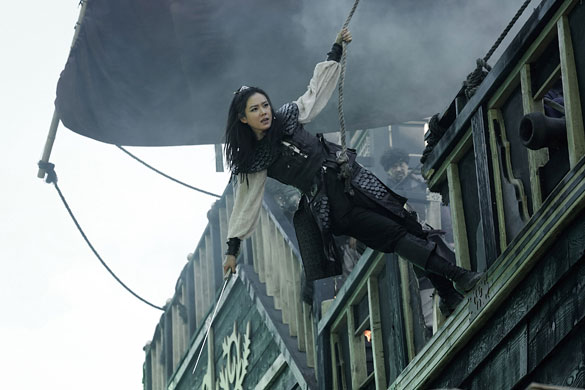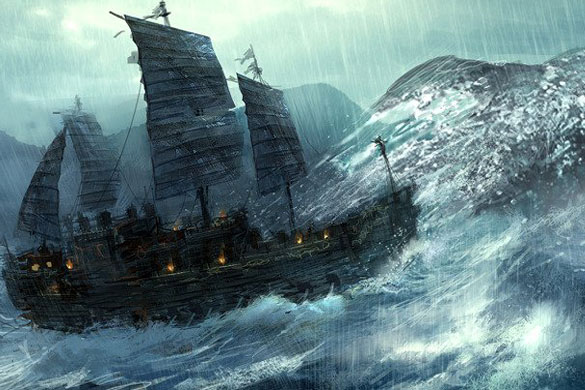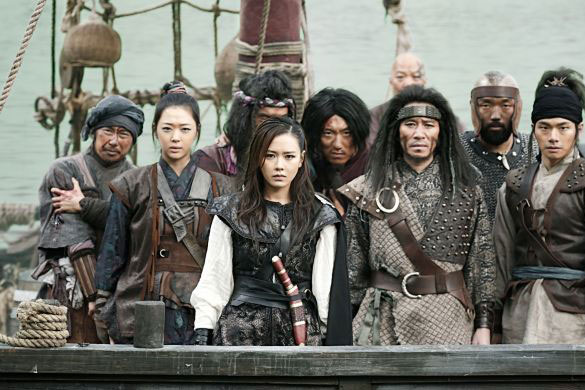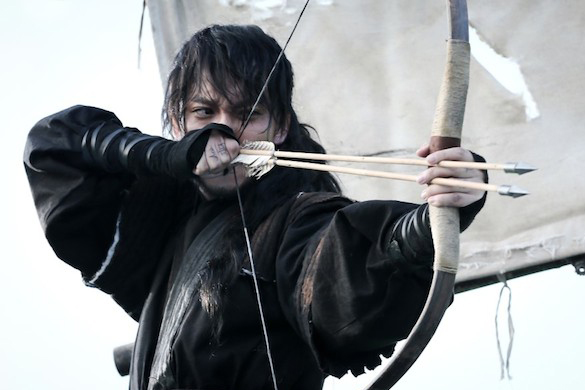"Don't even think about trying to touch me while I'm asleep!"
Synopsis:
A.D. 1388; at the very beginning of the Joseon Dynasty. On announcing a strategic retreat as part of a coup d'état against the Goryeo Dynasty, General Yi (Lee Dae-yeon) is accused of being a coward by Captain Jang Sa-jeong (Kim Nam-gil). Instantly, Yi orders one of his other men, Heung-gap (Kim Tae-u), to kill Sa-jeong and a vicious fight between the two ensues; Sa-jeong barely escaping to subsequently join a group of ‘Robin Hood'-esque bandits and Heung-gap being thrown in prison for his failure. Separately, a group of pirates led by So-ma (Lee Gyeong-yeong) and his first mate Yeo-wol (Son Ye-jin) are wreaking havoc in the Yellow Sea and have gone to great lengths to steal a number of golden statuettes as part of their ongoing pursuit of bounty. Some time later, a royal seal is sent to Yi to officially pronounce the new Joseon Dynasty but before it can be delivered the boat is sunk and the seal eaten by a whale.
Fearing for their lives, Yi's courtiers tell him the seal has been stolen by pirates and secretly task Heung-gap with finding the whale; Heung-gap (forcefully) enlisting the ‘help' of Yeo-wol who has since mutinied against her old pirate captain, So-ma.
As the search for the whale and the seal intensifies, pirates, bandits and soldiers soon head inextricably and ever-closer towards an utterly cataclysmic encounter...
Review:
Regularly in Korean cinema over the years, historical tales set in the Joseon era have provided everything needed for directors to create in-depth, insightful cinematic works that are not only entertaining but also utterly gripping; lending themselves in the process to nuanced social commentary of the period and, by comparative implication, Korean society of the present day.
Not only that, but (whether you consider narratives full of political intrigue such as 'The Concubine' and 'Shadows in the Palace'; look at dissections of attitudes to sex and sexuality as seen in 'Forbidden Quest', 'The Servant' etc; or focus on the twisted nature of a matriarchy hidden beneath an outward patriarchy, such as 'Untold Scandal'), many detail deeply serious subject matter but deftly manage to imbue their respective narratives with genuinely funny, often dark (and sometimes even black) humour throughout; lightening the load where necessary at the same time as ensuring that dramatic elements are all the more striking and memorable, in contrast.
 |
'The Pirates', outwardly at least, attempts to present a similarly intricate narrative (as can hopefully be seen from the above synopsis), humour filled in what I assume is an effort to enable it to stand alongside the aforementioned many exemplary Joseon era dramas at the same time as attempting to be an entertaining action spectacular, but dig just a smidgen beneath its glossy surface and the truth of the situation quickly becomes apparent:
For, here with have a film with an ultimately very simple narrative core - three groups of individuals heading on convergent journeys to catch a whale and secure the treasure it has ingested, each with its own particular, selfish agenda; be it greed, power or revenge - and the vast majority of the subplot narrative threads, character back-stories etc appear as much as a means of legitimizing the overall plot movement as anything else and any thoughts of deeper thematic notions are pretty much left at the door.
That said, it should be remembered that 'The Pirates' is a blockbuster through and through with a (wholly expected) focus on high-octane set pieces and visuals rather than narrative depth, and as such I honestly feel it should largely be dissected in that regard rather than in terms of anything more involved.
That being the case (and considering the fact that any viewer knowingly attending a screening of a blockbuster about pirates pursuing a whale that has swallowed a Royal seal should already be aware of the throwaway nature of the piece), to my mind the success of the film largely rests on how accomplished the realisation of these elements is, how well they combine and ultimately how enjoyable the plot journey with the characters is overall.
 |
As far as 'The Pirates' is concerned, the answer to the above is somewhat of a mixed bag, in most respects:
The physicality of the action scenes is accomplished throughout (especially Son Ye-jin's wire work and, almost, acrobatics) and the combat appearing is kinetically exemplary whether we're talking about hand to hand fighting, swords or altogether bigger weapons, but the CGI used in a number of scenes is somewhat noticeable and there is, in particular, a serious problem with some of the back-screening used;
Director Lee Suk-hoon wisely imbues the entire proceedings with a lighthearted tongue-in-cheek nature but while some of the humour (namely that of Son Ye-jin as pirate Yeo-wol and Yoo Hae-jin as pirate turned bandit Cheol-bong) some of the other 'funny' moments such as the majority featuring lead male actor Kim Nam-gil fall utterly flat;
Some of the characters themselves are engaging (again Son Ye-jin and Yoo Hae-jin) others are pretty unbelievable (again, Kim Nam-gil's character, Sa-jeong, repeatedly comes out looking like a vacuous fool rather than the - supposed - male hero of the piece), and as such as much of the character chemistry is lacking as is worthy of empathy; etc etc.
Ultimately, 'The Pirates' as a whole left me with a similarly mixed feeling: There is no question from my point of view that the film is an enjoyable romp throughout and watchable overall but the lingering thoughts are not only how much better it could have been if the above problems had been addressed but also how easy that would have been to achieve.
 |
Summary:
While 'The Pirates' is certainly a big budget, enjoyable romp there are numerous elements that are less accomplished than others and ultimately the lingering thought is just how easily the film could have been so much better.
'The Pirates' (해적: 바다로 간 산적) / 2014 / directed by Lee Suk-hoon
|






